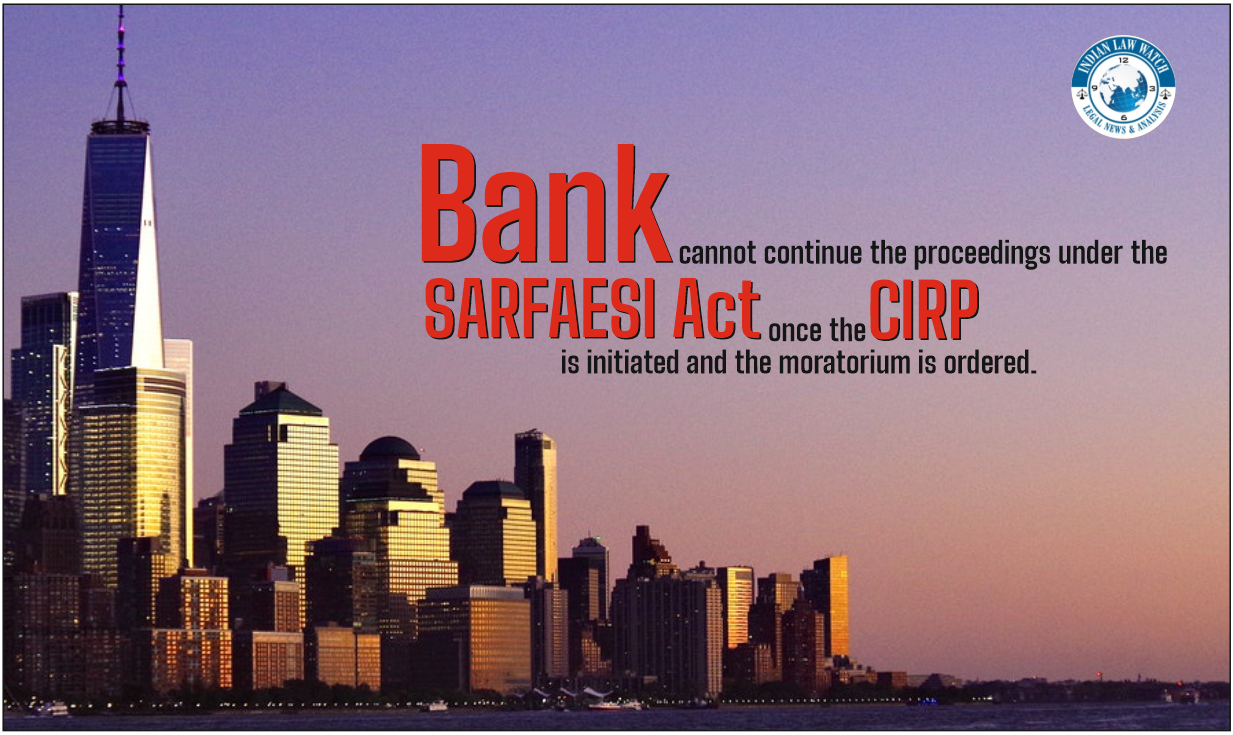

Recently a two judges bench of the Supreme Court of India held that once the corporate insolvency resolution process is initiated, all actions under the Securitization and Reconstruction of Financial Assets and Enforcement of Security Interest Act,2002 (SARFAESI) to foreclose, recover, or enforce any security interest are prohibited.

The appellate bank provides certain credit facilities to the corporate debtor. As the corporate debtor failed to repay the dues, the loan account of the corporate debtor was classified as a non-performing asset (NPA). The appellant bank issued a demand notice under section 13(2) of the Securitisation and Reconstruction of Financial Assets and Enforcement of Security Interest Act, 2002 (SARFAESI Act. 2002) calling upon the Corporate Debtor and its guarantors to repay the outstanding amount due to the appellant Bank. Since the corporate debtor failed to comply with the demand notice and pay the dues, the secured creditor i.e. appellant bank took symbolic possession of two secured assets (one of the corporate debtor and the other of the guarantor) mortgaged with it. The appellant bank issued an E-auction notice on 27-09-2018.
In the meantime, the corporate debtor filed a petition before the National Company Law Tribunal (NCLT) under section 10 of the Insolvency and Bankruptcy Code (IBC), 2016, for initiating the voluntary Corporate Insolvency Resolution Process (CIRP). National Company Law Tribunal (NCLT) admit the petition for initiating the Corporate Insolvency Resolution Process (CIRP) and issue a moratorium under section 14 of the insolvency and bankruptcy code (IBC), 2016.But the appellant bank continued the auction proceedings and accepted the remaining 75% of the bid sum and complete the transaction and realize its security interest.
The promoter of the Corporate Debtor filed an application before the National Company Law Tribunal (NCLT) to set aside the security realization during the Corporate Insolvency Resolution Process (CIRP) period carried out by the appellant Bank or in the alternative to cancel the impugned transaction. The National Company Law Tribunal (NCLT) set aside the sale of the property owned by the Corporate Debtor. The national company law appellate tribunal (NCLAT) upholds the order of NCLT.

In the present case, the two judges bench of the Supreme Court of India was dealing with the issue that whether the action under the SARFAESI Act to foreclose, recover or enforce the security interest can be taken if CIRP has been initiated.

The bench observed that after the CIRP is initiated, there is a moratorium for any action to foreclose, recover or enforce any security interest created by the Corporate Debtor in respect of its property including any action under the Securitization and Reconstruction of Financial Assets and Enforcement of Security Interest (SARFAESI) Act, 2002.
While pointing out the overriding effect of the insolvency and bankruptcy code (IBC), 2016 and referring to the decisions of the Apex court in the Innovative Industries Limited v.
ICICI Bank and another (2018) 1 SCC 407 and Principal Commissioner of Income Tax v. Monnet Ispat and Energy Limited (2018) 18 SCC 786, the court observed that “IBC is a complete Code in itself and view of the provisions of Section 238 of the IBC, the provisions of the IBC would prevail notwithstanding anything inconsistent therewith contained in any other law for the time being in force.”
The court further observed that the sale would be complete only when the auction purchaser makes the entire payment and the authorized officer, exercising the power of sale, shall issue a certificate of sale of the property in favour of the purchaser in the Form given in Appendix V to the said Rules.

While rejecting the contention of the appellant bank that the sale was complete upon receipt of the part payment, the bench held that the balance amount has been accepted by the appellant Bank on 8th March 2019 hence the sale was on the date of receiving of full payment. While observing that under section 14(1) (C) of the insolvency and bankruptcy code, 2016 any action to foreclose, recover or enforce any security interest created by the Corporate Debtor in respect of its property including any action under the SARFAESI Act is prohibited, the bench held that appellant Bank cannot continue the proceedings under the SARFAESI Act once the CIRP is initiated and the moratorium is ordered.





